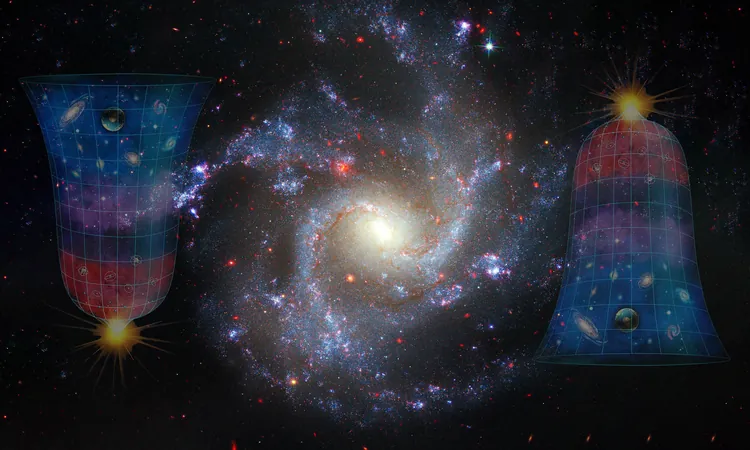
NASA's Webb: Why Our Understanding of the Universe Might Be Radically Incorrect
2024-11-30
Author: Ting
NASA's Webb: Why Our Understanding of the Universe Might Be Radically Incorrect
For decades, the scientific community has been grappling with an age-old dilemma: just how fast is our universe expanding? This crucial measurement, known as the "Hubble constant," affects everything from the formation of galaxies to their potential separation in the distant future.
The Hubble Tension Dilemma
Despite the noble efforts of some of the brightest minds in astrophysics, the quest to nail down this expansion rate has led to an intriguing, yet perplexing situation known as “Hubble tension.” Physicist Adam Riess of Johns Hopkins University, who famously won a Nobel Prize for revealing that the universe is expanding at an accelerating rate due to dark energy, has been at the center of this debate. He indicated that rather than coming closer to a solution, we might fundamentally misunderstand the universe itself.
The Importance of the Hubble Constant
Understanding the Hubble constant is crucial for cosmic mapping. Named after Edwin Hubble, the astronomer who first observed the receding motion of galaxies, this constant provides insight into the universe's age and its ultimate destiny. For years, estimates of the universe's age varied drastically, from as little as 10 billion years to as much as 20 billion years. Thanks to the Hubble Space Telescope’s observations—including those of Cepheid variable stars, which act as cosmic yardsticks—we currently estimate the universe's age to be around 13.8 billion years.
Enter the James Webb Space Telescope
Speculation arose surrounding how much Hubble's data may have skewed our understanding of cosmic distances. Then came the James Webb Space Telescope (JWST), touted as Hubble’s successor. Its infrared observations appeared to corroborate Hubble’s optical data, leading Riess to state that together, these instruments offer the most reliable measurements of the universe's expanding nature. However, a significant discrepancy remains between local observations and those gathered from ancient cosmic backgrounds, which consider the universe as it existed shortly after the Big Bang.
A New Approach by Brenda Frye
In an exciting development set for October 2024, Brenda Frye from the University of Arizona, alongside an international team, employed a unique method using gravitationally lensed supernovae to measure the Hubble constant. This innovative technique involved observing a cluster of galaxies that acted as a lens, magnifying the light from a Type Ia supernova—an explosive event from a white dwarf star. Their findings yielded a Hubble constant of 75.4 kilometers per second per megaparsec, aligning with local measurements while somewhat contrasting with earlier universe estimates.
The Ongoing Mystery
Despite Frye's promising results, the underlying Hubble tension persists, posing more questions than answers. It suggests that exciting yet elusive pieces of new physics could be waiting to be uncovered. Perhaps our comprehension of dark energy, dark matter, or other cosmic phenomena needs refreshing, or we could be on the brink of revolutionary ideas like extra dimensions or variations in gravity’s behavior across vast areas of space.
Could there be unknown particles influencing cosmic expansion? Or is it possible we’re investigating the wrong areas entirely? The exploration for answers in rocks on Earth could yield new insights into dark matter, challenging the status quo of our current theories.
Looking Towards the Future
The quest for understanding the universe’s mysteries continues to inspire a vast array of research. Upcoming missions, such as NASA's Nancy Grace Roman Space Telescope and the European Space Agency's Euclid mission, promise to dive deeper into these enigmas and may provide new insights into the fabric of the cosmos.
As we stand on the verge of cosmic discovery, the ever-expanding universe keeps revealing that it holds more secrets than we can imagine. This ongoing investigation into how fast our universe is expanding underscores the thrill of scientific inquiry, reminding us that every answer only leads to more profound questions.
Stay tuned, because the universe is not done surprising us yet!




 Brasil (PT)
Brasil (PT)
 Canada (EN)
Canada (EN)
 Chile (ES)
Chile (ES)
 España (ES)
España (ES)
 France (FR)
France (FR)
 Hong Kong (EN)
Hong Kong (EN)
 Italia (IT)
Italia (IT)
 日本 (JA)
日本 (JA)
 Magyarország (HU)
Magyarország (HU)
 Norge (NO)
Norge (NO)
 Polska (PL)
Polska (PL)
 Schweiz (DE)
Schweiz (DE)
 Singapore (EN)
Singapore (EN)
 Sverige (SV)
Sverige (SV)
 Suomi (FI)
Suomi (FI)
 Türkiye (TR)
Türkiye (TR)